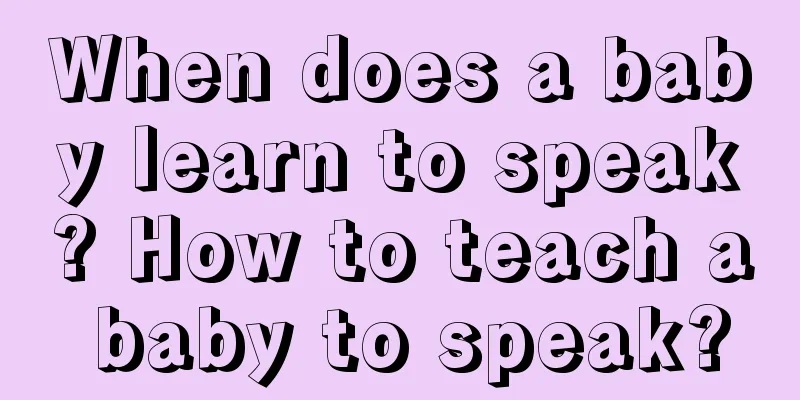When does a baby learn to speak? How to teach a baby to speak?

|
After a baby is born, the baby's changes are obvious at each growth stage. So when does a baby start to learn to speak? How can a mother teach her baby to develop his language ability faster? When will babies respond to their own names?The baby will respond to his name at 5 months old. In daily life, talking to the baby more and repeating his name will help him understand. Soon, he will be able to associate his name with himself. When you call him, he will turn his head towards you. My baby keeps babbling. When will he be able to speak?Many babies can say 1-2 words at 12 months old, and many babies don't say their first word until 16-18 months old. Most babies understand the meaning of many words at the age of 1, and they understand more than they can say. If your baby babbles and imitates various sounds, he is actually responding to you, indicating that he understands what you mean, and the day when he can speak is just around the corner. How many months does the baby start talking?The first formal language expression in a baby's life is the first cry. At first, he uses his tongue, lips, palate and any new teeth to make sounds, "oh" and "ah" in the first month or two, and soon after, he can babble. 4-5 months: The baby may occasionally say "Mom" or "Dad" for the first time. This does not mean that the baby can speak. Parents, don't get excited. At this time, the baby has not really associated these words with you. It will take until the baby is about 1 year old to understand the true meaning of "Mom and Dad". 6-9 months: The baby can speak more. When he murmurs or pronounces words, the mother finds it very interesting. In fact, the baby is imitating the tone and intonation of adults, which is also a way to learn to speak. The mother can read to the baby to encourage his babbling, or talk to the baby more, let the baby imitate more, and exercise language skills. 12-17 months: At this time, the baby can already understand the meaning of some words and can say them accurately. The baby will even practice changing the tone of voice, raising the tone of voice when asking questions, and asking a correct question sentence. At this time, the baby gradually realizes the importance of speaking and the powerful power of language in expressing his needs. 1.5-2 years old: The baby's vocabulary may be as many as 200 words, most of which are nouns. The baby cannot understand the use of the first person, but he will call out his name and make requests. Between 18-20 months, the baby learns 10 words a day or more. Some babies can learn a new word every half an hour. Mothers can show their babies some new things and tell them the names of the objects, and the baby will learn them quickly. How to teach your baby to talk"Talk" as early as possible: Don't wait until your baby can talk to him. You can talk to him as early as possible, even from the moment he is born. Of course, this conversation is mostly conducted in non-verbal ways, such as carefully recording and distinguishing the type of crying of the baby (hungry, sleepy, tired, afraid, etc. each have their own way of crying), and responding and satisfying accordingly. In addition, as the baby grows up, the baby's way of expression becomes richer and richer, and he begins to make various babbling sounds. At this time, imitate the baby, and he will definitely be very happy. Use "mother talk": In daily life, when talking to a babbling baby, the mother (or other family members) often unconsciously slows down the speed of speech, raises the voice and uses an exaggerated tone to say or repeat some short words or sentences. This is the so-called "mother talk". Babies are very fond of this because slow speech, exaggerated tone, high voice and repetition are the easiest for babies to understand, which can help them feel and learn language better. Be a "tour guide" for your baby: Babies are "new guests" in this world. They are confused about even the most basic things like taking a bath and eating. At this time, we need to be a good "tour guide" for the baby, such as using a friendly voice and changing intonation to tell the baby about the things and events he is facing. A natural and friendly language "tour guide" is very effective in improving children's language skills and is also conducive to their social development. Become a "reader": The practice of many excellent families has proved that if you insist on reading aloud to your children, telling them more stories, and exposing them to excellent Chinese rather than traditional baby talk from the very beginning, your baby's language ability can develop to a surprising level. How to get your baby to speak as early as possibleLanguage training for 0-1 years old: Speak to your baby: Babies who cannot speak can receive information through their ears, laying the foundation for their future "speaking". If parents convey everything in daily life to their baby through clear, accurate, vivid language and corresponding actions, the baby will be very interested in your words and try to express them in babbling. Create opportunities for babies to make sounds: Babies will use sounds like "ya, ya, ha, wu" to express their wishes, which is a good opportunity to cultivate babies' imitation of pronunciation. When they express that they want to be held, drink milk, or their diapers are wet, mothers can take the opportunity to express these wishes to them in simple words, and then wait for the baby's response. Repeating this every day is equivalent to strengthening these languages in their minds, and eventually making it easier for children to imitate language. Language training for 1-2 years old: Give more stimulation to encourage children to speak: Objects around you are good tools for educating your baby to learn language. Point out these daily necessities or toys to your baby, tell him the name, purpose, shape, etc. of these things, and then ask the child what they are, what color they are, and what their purpose is. This can not only help the baby learn some common sense of life, but also help him accumulate new terms and promote language development. Satisfy requests half a beat late: When babies want something, they often stare at it or grab it with their hands. At this time, mothers should not satisfy them immediately, but hold it in their hands and encourage them to say what they want. If the child can't say it well, mothers can demonstrate first and let the baby "learn" and then give these things to the child. Repeat what has been said: prepare a set of animal cards. After the baby knows the animals, ask him to tell his mother what is on each card. You can also use a simple picture book, with the mother reading a page and the baby repeating it, and then moving on. In short, use every opportunity to get the baby to speak. |
>>: How long will the baby's anorexia last? How to regulate the baby's appetite?
Recommend
Will eating pork belly make childbirth smoother? How to make childbirth smoother
A smooth delivery helps the mother recover after ...
Is having a second child the same as having a first child?
After the second-child policy came out, many pare...
Can I eat okra while breastfeeding? Is it good to eat okra while breastfeeding?
Okra is not only a very good food for men, but al...
Can you use aloe vera gel on stretch marks? It's not very useful.
Many people have heard that aloe vera gel can rem...
When do infants and young children develop their abilities? Three major development indicators
Infants and young children basically start to dev...
How to clean a bath towel if it has a peculiar smell? Is it hygienic to wash the bath towel in a washing machine?
Maybe it's because the weather has not been v...
How to prevent your baby from getting lost: 6 tips you must know
In recent years, there have been many cases of ba...
What are the materials of baby bottles? What is the best material for baby bottles?
A baby's milk bottle is a necessity during th...
Is it good for babies to bask in the sun? Does it have any effect on babies' eyes?
Is it good for baby's eyes to bask in the sun...
When is the best time to remove a baby's birthmark?
When is the best time to remove a baby's birt...
What are the symptoms of infertility? What are the symptoms of infertility?
Many newlyweds have a strong desire to have child...
How to improve your baby's emotional intelligence: 6 must-learn tips
Excellent babies need to be cultivated from an ea...
Is it better to change toothpaste frequently or not? Why can't we always use the same toothpaste?
I usually use the same toothpaste all the time an...
How to deal with children who don't do their homework? Why do children not want to do their homework?
Recently I found that my child did not do his hom...
How many times a day is normal for a newborn baby to have bowel movements after breastfeeding?
How many times a day is normal for a newborn baby...









